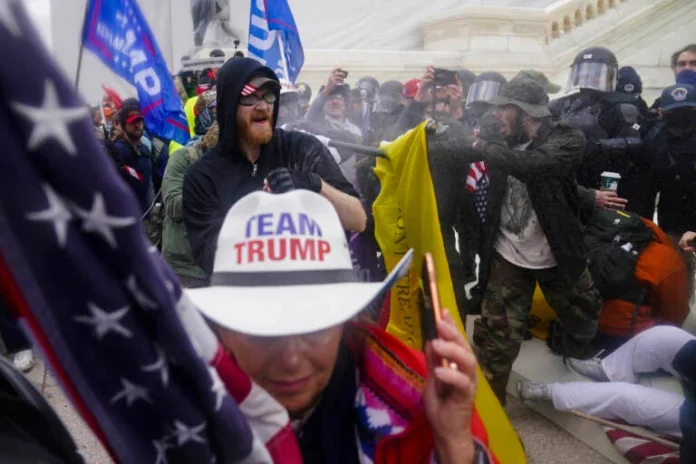The ongoing legal battle to install a Capitol Police plaque at the U.S. Capitol has reached a new milestone. On June 12, 2025, two police officers who defended the Capitol during the January 6, 2021, attack filed a federal lawsuit demanding that Congress fulfill its own law and erect a memorial honoring law enforcement. The lawsuit, brought by former U.S. Capitol Police Officer Harry Dunn and D.C. Metropolitan Police Officer Daniel Hodges, highlights the refusal of federal officials to install the plaque, despite a 2022 law mandating its placement. This Capitol Police plaque is meant to commemorate the bravery of officers who stood against the violent mob attempting to overturn the 2020 election results.
The Fight for Recognition
Harry Dunn and Daniel Hodges are not just names on a lawsuit—they are living symbols of the sacrifice and resilience shown by law enforcement on that fateful day. Over 100 officers were injured during the Capitol attack, many suffering lasting physical and emotional scars. The 2022 law, signed by President Biden, required the Architect of the Capitol to install a plaque listing the names of officers who responded to the violence. The deadline for installation was set for March 2023, but more than two years later, the plaque remains in storage.
The lawsuit argues that the failure to install the Capitol Police plaque is not just a bureaucratic oversight, but a deliberate attempt to rewrite the history of January 6. The officers claim that as political winds shifted, some leaders began to minimize the violence and even honor those who inspired the attack, rather than the officers who defended democracy. The plaque, they say, is a necessary step to ensure that the courage of law enforcement is remembered and respected.
Political Backdrop and Public Outcry
The controversy over the Capitol Police plaque has become a flashpoint in the ongoing national debate about January 6. After the 2022 law was enacted, the political narrative surrounding the attack began to change. Former President Trump and some Republican allies started referring to the day as a “day of love” and suggested that law enforcement, not the rioters, should be held accountable. The lawsuit points to these statements as evidence of a broader effort to downplay the events of January 6.
House Speaker Mike Johnson, who has the authority to authorize changes to the House side of the Capitol, has not directed the Architect of the Capitol to install the plaque. When questioned, Johnson stated that the issue was “not on my radar.” This lack of action has angered victims, law enforcement organizations, and even some Republican lawmakers. Democrat Rep. Dan Goldman has publicly criticized Republican leadership for their inaction, calling their words of support for law enforcement “meaningless” until the plaque is installed.
The lawsuit also notes that while the Capitol Police plaque remains in storage, some members of Congress have found ways to honor the man who inspired the violence, rather than the officers who defended the Capitol. This stark contrast has only deepened the divide over how January 6 should be remembered.
Legal and Symbolic Stakes
The legal action filed by Dunn and Hodges is not just about a piece of metal on a wall. It is about setting the historical record straight and honoring those who risked their lives to protect democracy. The lawsuit alleges that the failure to install the Capitol Police plaque violates the Equal Protection clause of the Constitution and represents a breach of Congress’s own legislation.
The emotional toll on the officers is significant. Both Dunn and Hodges have spoken openly about the lasting impact of January 6 on their lives. Dunn, who is Black, faced racial slurs from rioters during the attack and has since become a vocal advocate for accountability. Hodges was nearly crushed in a doorway and suffered serious injuries. Their lawsuit is a plea for recognition and respect.
In April 2025, Architect of the Capitol Thomas Austin testified that he had not received final instructions from the House Speaker’s office to install the plaque. The plaque itself has been ready for over a year, but without authorization from leadership, it cannot be displayed. This bureaucratic limbo has only added to the frustration of those who believe the officers’ sacrifices deserve to be memorialized.
Looking Ahead: What’s Next for the Capitol Police Plaque?
The lawsuit is likely to bring the federal judiciary into a highly charged political debate. The case, filed in the U.S. District Court for the District of Columbia, could set an important precedent for how Congress honors law enforcement in the future. It also raises questions about the responsibilities of elected officials to follow through on their own laws, especially when those laws are meant to honor the defenders of democracy.
For now, the Capitol Police plaque remains in storage, a symbol of both the bravery of law enforcement and the ongoing struggle to ensure their sacrifices are not forgotten. The lawsuit by Dunn and Hodges is a reminder that the fight for recognition is far from over. Their courage in standing up for their fellow officers and for the truth about January 6 is itself a powerful memorial.
If you believe in honoring the sacrifices of law enforcement and preserving the truth about January 6, join the call for the immediate installation of the Capitol Police plaque at the U.S. Capitol.
